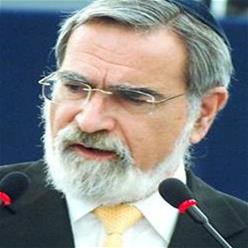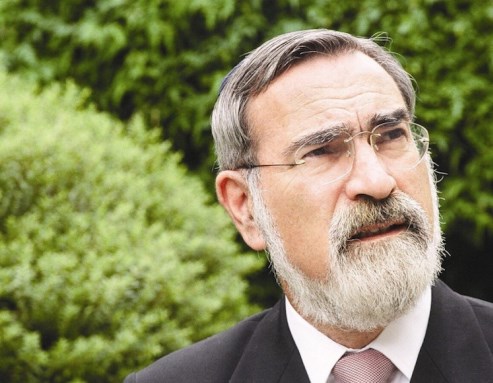Community
Lord Sacks: ‘Jews need to stop navel-gazing’
Rabbi Lord Jonathan Sacks is in the US promoting his new book. Rabbi Sacks answers some frank questions in an interview with JTA’s Uriel Heilman.

ANT KATZ with JTA
Rabbi Lord Jonathan Sacks a philosopher and member of the UK House of Lords. We served as the Chief Rabbi of the United Kingdom and the Commonwealth from 1991 to 2013. He is currently in America lecturing and promoting his latest book, “Not in G-d’s Name: Confronting Religious Violence.”
JTA’s Uriel Heilman caught up with him in New York for a conversation about his prolific writing pace (25 books and counting); a new line of Koren Sacks prayer books; the crises facing Jews today; and whether, at 67, Rabbi Sacks would consider the presidency of Yeshiva University.

A: I used to take, when I was chief rabbi, six weeks in the summer, and instead of taking a holiday I’d write a book. You go into a kind of trance when that happens. I’d be thinking about it for the preceding year, so it wasn’t out of nothing. At the age of 40 I completed my first book, and I’ve done one a year since. I usually write the books I want to read. Long ago I made a list of the books that I think need to be written, and I just knock them off one by one.
You know what your next project will be already?
Well, I know what’s for the next 20 years, we should all live so long.
You have 20 lined up?
Oh, more. I’m sorry about that, but that’s how it goes.
What’s your next project?
I am writing a new commentary to the Chumash [the Bible]. There was a commentary — it’s still used in Anglo Jewry — called the Hertz Chumash, written by one of my predecessors. It is a commentary that asks: How do we set this against its historical background? What does it mean to us today? Nobody’s done a Hertz Chumash since Hertz a century ago and it’s an urgent necessity. ArtScroll anthologizes traditional commentaries and it’s done tremendously well. But they have not stepped outside that world of the yeshiva and said how do we make sense of this today?
Maimonides wasn’t a Reform Jew
That sounds almost Reform.
If Maimonides was a Reform Jew, then I suppose it is. But Maimonides wasn’t. That is the classic tradition. The rabbis formulated it in a very simple way: There’s the Written Law and Oral Law. Although the text never changes, you always need that act of interpretation to translate the word of G-d for all time into the word of G-d for this time. Generation after generation reads the same words and says: Was that then or is that now? There’s a mitzvah to live in our time.
There’s a lot of disagreement among Jews when it comes to interpretation.
Judaism is a religion of argument. It’s the classic environment. Judaism is a coral symphony scored by many voices. I don’t see that as a problem. I see that as a sign of vitality.
Tell me about your new book about religious violence.
I have tried to get to the roots of the historically fraught and potentially violent relationship between Jews, Christians and Muslims. [Those roots are] highly specific narratives in the Hebrew Bible, the New Testament and the Koran, all of which lead back to the stories of sibling rivalry in Genesis. Sibling rivalry, according to Sigmund Freud, is the primary driver of violence through history. It’s a very serious book to be read seriously by people who care for the future of humanity. It took me 12 years to write.
Is this a Jewish book?
“Not in G-d’s Name” was very consciously written for an audience that is predominantly not Jewish. It is directed to Jews, Christians and Muslims with equal emphasis on all three. I’m really trying to make a statement in the book, that navel-gazing is not necessarily the best answer for the Jewish people right now. We are living in a very dangerous world. The people of Israel are exposed to immense danger, and now is not the time for internecine, domestic squabbles. We have to stand hand in hand and shoulder to shoulder with Christians, moderate Muslims, secular humanists and people of other faiths in defense of religious freedom and humanitarian values. Because right now we are at one of the most dangerous turning points in history.
What’s the danger?
I don’t know if the West really knows what to do with radicalized political Islam. I don’t know if the Muslim world really knows what to do with it.
Do the Jews know what to do with it?
Fundamentalism is the attempt to impose a single truth on a plural world. Jews have always stood against that. We never went with the majority. We insisted on our right to be different. That is why Jews carry a very important message to the world. If you’re al-Qaida or ISIS, attempting soon or eventually to impose the caliphate on the world, you will have to oppose the Jews and the State of Israel because historically we were the ones who stood against them.
I imagine you’re often asked about anti-Semitism in Europe.
If it is not safe to be a Jew in Europe, it is not safe to be a human being in Europe, and if Europe ever lost its Jews it will have lost its soul. So this is a big problem. And the real trouble is that Jews continue to talk about it in a way that does not communicate itself to non-Jews. There’s a deep danger when the Jewish response to anti-Semitism is complaining to other Jews or using language that will only really be heard by other Jews. It’s the ultimate exercise in futility.
Is there a crisis of leadership in the Jewish world today?
There’s a crisis of leadership in the world. That is manifest. And there’s a great desire for magical leaders who will solve the problems of the world, and that leads to violence, tyranny and all sorts of bad things. So we are in a crisis of democratic leadership, I would say.
But what about in the Jewish world?
I’m very impressed by the rabbinate here in America. Not an easy position; it never was. I’ve travelled to a lot of communities and seen a lot of very, very impressive young Orthodox rabbis and young leaders.
Yeshiva University is beginning its search for its next president. Would you be interested in the job?
No comment.
This interview has been condensed for clarity.
- Rabbi Jonathan Sacks’ latest book is “Not in G-d’s Name: Confronting Religious Violence.” (United Synagogue)
Denis Solomons
October 16, 2015 at 10:08 am
‘Surely the SAJR should know that one should spell hashem’s name G- d and not as they continually print it in the text.
\nA chiel Ha lashem !
\n
Hi Denis, as one of the most regular users, you are no doubt aware that our normal policy and style does indeed follow the G-d spelling. We did, in fact, ponder over the spelling in this case given the esteem that Rabbi Lord Sacks has among world Jewry, and the fact that he elected to spell it this way. In deference to your comment we have gone back to using our normal style and appreciate your sharing your view. Should we have missed any of the words, please don’t hesitate to point it out to us – online.editor@sajr.co.za
\n
‘
Gary
October 16, 2015 at 1:06 pm
‘Rabbi Sacks is a hypocrite-he says he is against world Islamist domination But he called on David Cameron to accept thousands of Islamic migrants whose aim is to force Islam on Britain and who will set up child rape gangs and sharia zones’
Rabbi Kahn
October 18, 2015 at 7:16 am
‘Nonsense. There is absolutely no problem with writing God as God. True, some have a custom to write G-d, and that’s very nice, but there is no prohibition and certainly no chilul Hashem (see how to write it) to write GOD. ‘
fronya
October 19, 2015 at 5:17 pm
‘\”The question is whether [holiness] applies only to Hebrew names of God or the English name of’ ‘God’ as well. The common rabbinic opinion is that \”God\” written in any other language other than Hebrew has no holiness and can be erased (Shach Y.D. 179:11; Mishna Berurah 85:10)\”
\n
Click to read ASK THE RABBI on Aish.com
‘